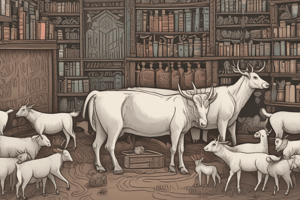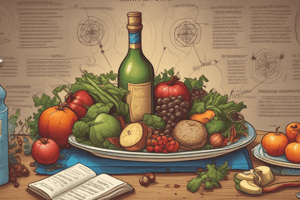Podcast
Questions and Answers
Which animals are forbidden to be eaten according to the Torah?
Which animals are forbidden to be eaten according to the Torah?
Camels, badgers, hares, and pigs
What does the prohibition of maytah relate to in Jewish dietary laws?
What does the prohibition of maytah relate to in Jewish dietary laws?
Consumption of non-kosher milk and its derivatives
What must be done to meat from birds and mammals before consumption according to Jewish law?
What must be done to meat from birds and mammals before consumption according to Jewish law?
Must be killed according to Jewish law and blood must be drained
Can meat be eaten with dairy products according to kosher dietary laws?
Can meat be eaten with dairy products according to kosher dietary laws?
Which types of food can be eaten with either meat or dairy?
Which types of food can be eaten with either meat or dairy?
What is the rule regarding utensils that have come into contact with meat or dairy?
What is the rule regarding utensils that have come into contact with meat or dairy?
What does the term 'maytah' refer to in the context of kashrut?
What does the term 'maytah' refer to in the context of kashrut?
What is chalav akum?
What is chalav akum?
What is gevinet akum?
What is gevinet akum?
Why is stam yeinam wine forbidden for consumption by Jews?
Why is stam yeinam wine forbidden for consumption by Jews?
What is the purpose of the prohibition of maytah in kashrut?
What is the purpose of the prohibition of maytah in kashrut?
How does following the rules of kashrut demonstrate the Jewish community's commitment?
How does following the rules of kashrut demonstrate the Jewish community's commitment?
Flashcards are hidden until you start studying
Study Notes
Kosher Dietary Laws: Prohibition of Maytah
Kashrut, the Jewish dietary laws, dictate a specific set of rules that govern the consumption and preparation of food within the Jewish community. One aspect of these laws involves the prohibition of certain foods and substances that are considered forbidden or "treif" (non-kosher). This article will focus on the specific prohibition known as maytah, which relates to the consumption of non-kosher milk and its derivatives.
Understanding Kosher Dietary Laws
Before delving into the specifics of maytah, it's essential to understand some fundamental principles of kosher dietary laws:
Forbidden Animals and Foods
The Torah specifies animals that cannot be eaten at all, such as camels, badgers, hares, and pigs. Of those allowed, birds and mammals must be killed according to Jewish law, and blood must be drained from meat before consumption. Additionally, certain parts of permitted animals may not be consumed.
Separation of Meat and Milk
Meat (the flesh of birds and mammals) cannot be eaten with dairy products. Fish, eggs, fruits, vegetables, and grains can be eaten with either meat or dairy. Some commentators suggest that fish may not be eaten with meat.
Utensils and Contact
Utensils that have come into contact with meat may not be used with dairy, and vice versa. However, utensils that come into contact with non-kosher food may only be used with kosher food if they were contacted while hot.
Grape Products Made by Non-Jews
Grape products made by non-Jews are considered non-kosher due to the association with idolatry in ancient religious practices.
The Prohibition of Maytah
Maytah refers specifically to non-kosher milk, cheese made with non-kosher rennet, and wine produced without proper supervision. These substances are considered treif and, according to the rules of kashrut, should not be consumed or used in any way by Jews.
Non-Jewish Milk
Non-Jewish milk, also known as chalav akum, is milk that may contain admixtures of milk from non-kosher animals. It is forbidden for Jews to consume this type of milk directly or indirectly, such as through cooking or baking.
Non-Jewish Cheese
Cheese made with non-kosher rennet, called gevinet akum, is another example of a product forbidden under the rules of maytah. Rennet is an enzyme extracted from stomachs of ruminant animals, which aid in cheese production. If the rennet comes from a non-kosher animal, the resulting cheese would also be considered non-kosher.
Stam Yeinam Wine
Stam yeinam wine is not inherently non-kosher but is forbidden due to historical association with idolatry. In ancient times, wine was often used in religious rituals and sanctified for pagan purposes. As such, wine produced and sold outside the context of Jewish law is considered stam yeinam and should not be consumed by Jews.
In conclusion, the prohibition of maytah is one of several dietary restrictions outlined in kashrut. These rules aim to ensure that Jewish people maintain a distinct identity and separate themselves from non-kosher practices, both in their choice of food and in their observance of religious customs. By following these guidelines, the Jewish community demonstrates its commitment to maintaining its unique cultural and spiritual traditions.
Studying That Suits You
Use AI to generate personalized quizzes and flashcards to suit your learning preferences.




